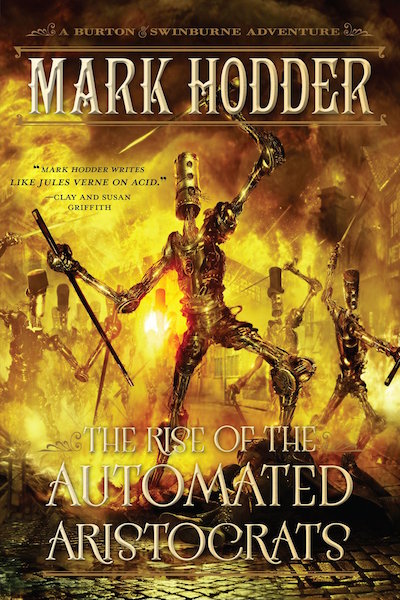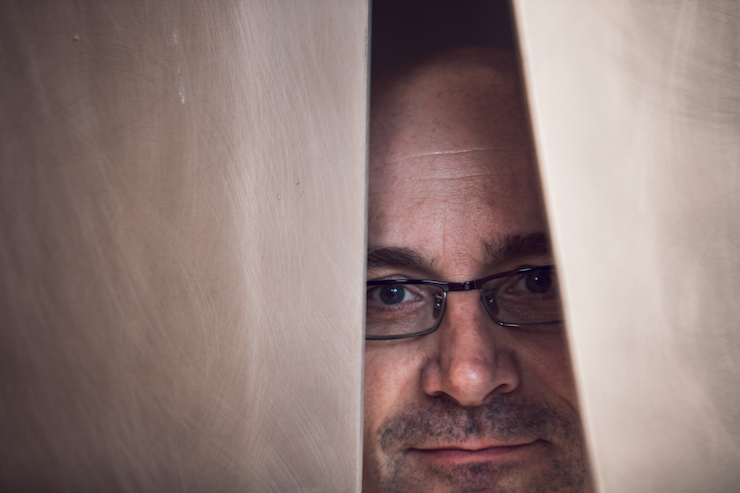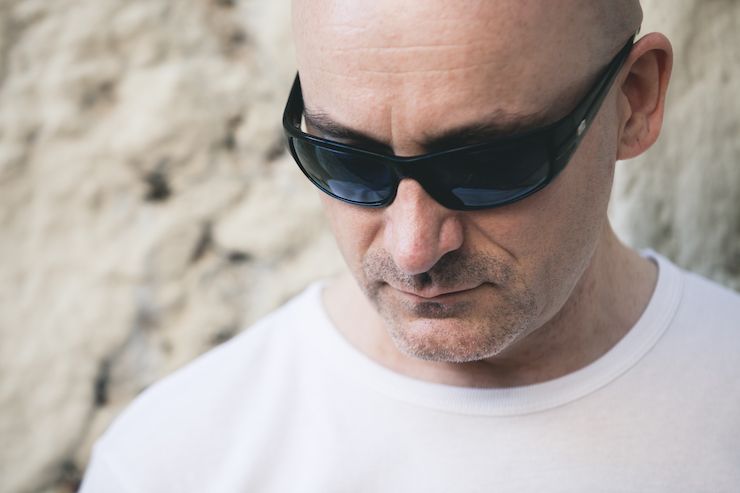Mark Hodder had been writing radio spots and web content, before he started being able to make a living as novelist. That was seven years ago. In our interview he weighs the pros and cons of his job, unveils his daily word count and shares some indispensable advice for aspiring authors.
You’re popular for the Burton & Swinburne novel series. What is it about?
The series, which is comprised of two trilogies, follows the adventures of the explorer Sir Richard Francis Burton and the poet Algernon Swinburne in an alternate version of the Victorian era. Burton realises that his world is somehow not what it should be, and sets out to discover why. The novels feature real people from the period, and many real events, but all reshaped by rather bizarre circumstances.
I’ve learned that the genre is called Steampunk. Could you please explain what that means, for those not familiar?
When I was eleven years old,some authors seemed like rock stars to me
Steampunk is a sub-genre of science fiction that uses Victorian technology, customs, and manners as a means to highlight how much we’ve changed in the past hundred and fifty years or so. For example, with the steam powered machinery of the period, all the moving parts were outside, you could see how things worked, whereas nowadays we have technology in which all the parts are static and hidden. In many respects, this is emblematic of current society. In the Victorian era, attitudes, prejudices and injustices were blatant and regarded as “just the way life is.” Now, such matters are denied, disguised or concealed behind a smugly complacent veil of political correctness. Other authors may argue that steampunk is more focused on fun, harking back to the “ripping yarns” of old, and this is certainly a prime ingredient, but personally I’m more intrigued by its potential for political and social commentary.
Have you always wanted to be a writer, or did it rather happen by chance?
When I was eleven years old, authors such as Edgar Rice Burroughs, Robert E. Howard and Michael Moorcock seemed like rock stars to me. I could think of nothing more thrilling than being a person who dreamed up wild stories all day long, and then had them published. I knew it was what I wanted to do, but I thought I had about as much chance of achieving it as I had of becoming the new lead singer in Led Zeppelin. Nevertheless, through school and into employment, I always steered myself into activities that were focused around writing. I became a radio commercial scriptwriter, a commercial copywriter, and an author of web content for the BBC. I figured, maybe I can’t write novels and get published, but at least I can practice the craft. It paid off. When I finally wrote my debut—The Strange Affair of Spring Heeled Jack—the construction of it came very easily.

Where does your inspiration come from?
As I’ve grown older, I’ve become more politicised and more intrigued by big questions, like “is religion a force for good or a force for evil?” I also ask myself rather stranger questions, like “if a time traveller changed the past so much that the future he came from ceased to exist, how could he correct the problem?” Usually such thoughts occur to me just as I’m stepping into the shower!
Can you sustain a living from your novels?
I have done for seven years. International sales are the key to it. Get published in enough countries, and you’ll just about scrape by.
How do you market your books? Do you have a publisher or do you do that by yourself?
Publishers will usually give you a big push for the first book in a series, or if you’re one of their new authors, but this soon drops off. You can’t rely on a sustained effort unless you turn out to be what they’re restlessly searching for, which is the next big thing, the next J. K. Rowling or Stephen King. So social media is becoming more important. As an author, you’re expected to keep an active blog, Facebook page, and Twitter account. Of course, time spent on these is time spent not working on your novel, so it’s a tough balancing act.
Unless you’re the nextJ. K. Rowling or Stephen King, you can’t rely on a publisher’s sustained marketing effort
November is the time of NaNoWriMo, a challenge where people try to write 50,000 words in a month. Can you tell what your average word count is?
I try to average 2,000 words a day. Often I’ll fall short of that. Sometimes I’ll double it. My ability to get “words on screen” ebbs and flows. I can have a week go by with very little achieved, and then suddenly I’m on fire, unstoppable, and making up for the lost time. The secret, I think, is to just go with it and have faith that the unproductive periods are more productive than you think (it’s all happening internally, your subconscious grappling with the plot).
What is your advice to someone who wants to become a writer?
Being a writer requiresphenomenal dedication and self-discipline, and is extremely insecure
Don’t wait for inspiration. Don’t focus on planning. Don’t agonise over the plot. Don’t wait for the right moment. Don’t make excuses. Don’t spend hours reading books about the art of writing. Don’t think it has to come out perfect first time. Just sit at the damned computer and start hammering the bloody keyboard! You become an author AFTER the words are written, when you look at them, see that they’re all messy, ill thought out, and just plain bad, and you set about correcting all the issues, gradually honing them to perfection (or as near as you can get to it).
Once you’ve conquered that part of it, get an agent but don’t presume you’ll get published.
If you do get published, don’t give up your day job, don’t expect to ever feel like you’re a success, don’t compare yourself to other authors, don’t chase market trends, don’t think your publisher will always back you, don’t let bad reviews get you down, don’t delay starting on your next novel.
Be obsessive. Be courageous. Be audacious. Be outspoken. Be yourself. Be a brand.
Don’t ever stop.
Write. Write. Write.
Is writer a good job? What are the pros and cons?
It’s a good job in that you’re doing what you love, you have greater freedom than most people, and you’re more or less in control of your own destiny. You can work naked, if you want. It’s a bad job in that it requires phenomenal dedication and self-discipline, is extremely insecure, is unlikely to make you rich or even comfortable, and can put strain on your relationships because no-one other than a fellow writer can possibly understand why you do it or what you go through.

How did you find Ulysses, and what do you like about it? Where do you see room for improvement?
I discovered Ulysses via an online review. It is, in my opinion, the perfect tool for a writer because you never have to think about it. The emphasis is firmly on what you are doing rather than where or how you are doing it. Ulysses has a superpower: invisibility. I can’t emphasise how important that is. When I’m struggling to express a complex idea in the correct way, I don’t want my thoughts interrupted by the app. I don’t want to think, “What’s this button for?” or “How do I add this?” or “Where’s the formatting menu?” or “Do I need to press Save?” Ulysses is a master at blending into the background and leaving me in peace.
Ulysses has a superpower: invisibility.
Here’s an example: I don’t much like keyboard shortcuts. I prefer the keyboard for writing and trackpad/magic mouse gestures for other stuff. With Ulysses, I back and forth a lot between the three different views — three pane, two pane, editor only — and, frankly, was getting a bit frustrated by having to use the ⌘1, ⌘2 and ⌘3 shortcuts for this. They suit some people, but not me. Then, recently, I discovered quite by chance that the swipe gestures in the iOS version work with the trackpad/magic mouse on the OS X version. Revelation! Ulysses invisible!
In terms of improvement, there’s a fine line between being “full featured” and “cluttered,” so I’m cautious about suggesting addition functions. That said, there’s one absent feature that I’d find very useful, it being the ability to colour tag the sheets in the sheet list. So, for example, in my current project, each sheet is a chapter, arranged chronologically from 1 to 28. Chapters 5, 10 and 18 are each in a state of very early draft and require considerable attention. It would be very useful to me if, in the sheet list, those three could be made to have, say, a pale red background. That “at a glance” tagging would work better for me than the current option, which is to add the keyword “DRAFT.”
Other than that, I find Ulysses does everything I need it to do, keeping things that could be complicated simple, maintaining its elegant good looks while doing so, yet also offering me just the right amount of customisation options so I can create my own writing environment. Love it!
